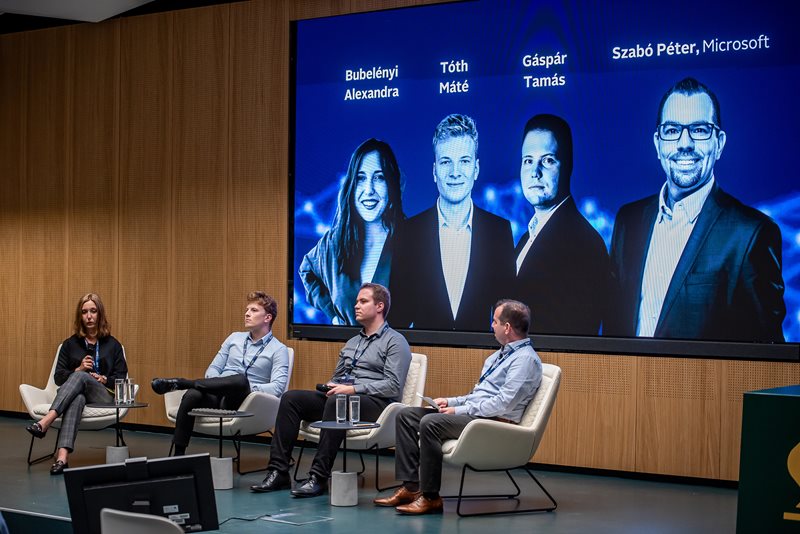The majority would not hire a worker who is not good at AI
How has AI developed, what is it currently used for and what is its future? These were the questions that the lecture and panel discussion held at the Gellért Campus on 12 June in the presence of Corvinus leaders and business partners sought to answer. Péter Baranyi, Research Professor at the Corvinus Institute for Advanced Studies (CIAS), held a lecture entitled “The intricate paths of artificial intelligence”. In 1900, David Hilbert, one of the world’s acknowledged greatest mathematicians, argued at a mathematical congress in Paris that, among other things, every function can be decomposed into tiny functions. In 1950, the Soviet mathematician Kolmogorov said that Hilbert was right, and then a huge change began, with the advent of computer graphics. It turned out that everything can be broken down into many small things, and finally the neural network appeared. As Baranyi said, between 1960 and 2000 there were huge debates among scientists, many things were said to be wrong research directions, but after 2000 they agreed and accepted important cornerstones, such as algorithms. These then started to be used in many universities. Baranyi also said in his presentation that there are 17 billion data in a single ChatGPT, a huge potential. He said that artificial intelligence is good because it is actually part of evolution and nature is doing a good job at it.
Those who use it are happier
This was followed by a panel discussion on “How artificial intelligence is shaping our profession, or what an economist needs to know to stay relevant”. Three students – who have already worked with AI in their theses – shared their experiences in response to questions from the moderator, Péter Szabó, Managing Director of Microsoft Hungary. The fifth participant was ChatGPT, “who” occasionally gave their opinion. As Szabó said, 75 percent of employees now use AI in some way, and 66 percent of managers say they would no longer hire an employee who is not AI-savvy.
Szabó then asked the students how much they use ChatGPT themselves and their circle of friends. Alexandra Bubelényi, a third-year student of Business Informatics, said that few people in her circle of friends use ChatGPT, but she uses it for code cleaning, debugging and simple text generation. Tamás Gáspár, a third-year student of Economics and Management, uses ChatGPT to create shopping lists, for example, and thinks it is also useful for selecting who to invite for interviews from thousands of applicants. He said that some of his relatives fear that his job will no longer be needed because of AI. According to Máté Tóth, a third-year student of Business Informatics, many companies in Hungary do not allow the use of this tool, but he believes that this will be the case for a short time because companies have to use this tool because of competition, as it can be used to complete a series of tasks quickly. Then there was a discussion on what it means to understand AI. According to Bubelényi, employers should hire someone who can decide whether the AI has given the right answer to a question. Tamás Gáspár said that it is good if someone can communicate clearly with the AI, Máté Tóth said that many people at the university already use the AI, but he said that in the short term it would not be good if students use it as a resource for writing their thesis.

Péter Szabó also asked perhaps the most important question to his interlocutors: How will AI change the economic professions? According to Máté Tóth, more than half of the work can be automated, for example, in many places trainees perform tasks that AI can already perform. AI will change the job market, in the future economists will have more time for analysis than they do now. It was said that it would be good to have a panel discussion at some point where employers could tell us what they can use AI for. All three students agreed that many people fear for their jobs, that fear of the unknown is at work in employees, that existential anxiety is common – they experience this in their circle of acquaintances. Social inequalities are also increasing, according to the students. Szabó added that older people use AI well, and a survey showed that 80 per cent of those who use it are happier than those who don’t. According to Tamás Gáspár, “an architect friend of mine sees that in the future, a higher value product will be characterised by someone producing it without AI, for example a handicraft”.
ChatGPT responded to a question that the advantage of AI is that it eliminates monotonous jobs, but the disadvantage is that many people will need retraining, which increases the insecurity of workers. One thing is for sure, as Péter Szabó pointed out, MI is coming, it has to be dealt with.
Katalin Török